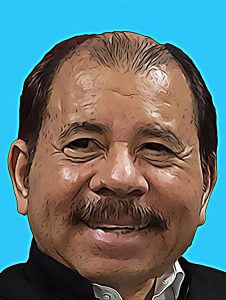1 Dec 2022 | Belarus, Campaigns, China, Equatorial Guinea, Iran, Mexico, News and features, Nicaragua, North Korea, Qatar, Russia, Saudi Arabia
At the end of every year, Index on Censorship launches a campaign to focus attention on human rights defenders, dissidents, artists and journalists who have been in the news headlines because their freedom of expression has been suppressed during the past twelve months. As well as this we focus on the authoritarian leaders who have been silencing their opponents.
Last year, we asked for your help in identifying 2021’s Tyrant of the Year and you responded in your thousands. The 2021 winner, way ahead of a crowded field, was Turkish president Recep Tayyip Erdogan, followed by China’s Xi Jinping and Syria’s Bashar al-Assad .
The polls are now open for the title of 2022 Tyrant of the Year and we are focusing on 12 leaders from around the globe who have done more during the past 12 months than other despots to win this dubious accolade.
Click on those in our rogues’ gallery below to find out why the Index on Censorship team believe each one should be named Tyrant of the Year and then click on the form at the bottom of those pages to cast your vote. The closing date is Monday 9 January 2023.
VOTING HAS NOW CLOSED. SEE WHO YOU VOTED AS TYRANT OF THE YEAR 2022 HERE.
1 Dec 2022 | Nicaragua, Tyrant of the Year 2022
 There is nothing more disappointing (or predictable) than a revolutionary hero turned tyrant. In the great tradition of Lenin and Castro, Ortega promised a new dawn as the leader of the rebel Sandinista National Liberation Front which opposed the Somoza family dictatorship in the late 1970s.
There is nothing more disappointing (or predictable) than a revolutionary hero turned tyrant. In the great tradition of Lenin and Castro, Ortega promised a new dawn as the leader of the rebel Sandinista National Liberation Front which opposed the Somoza family dictatorship in the late 1970s.
Ortega first took power in 1979 after the overthrow of the regime and served until 1990, first as the head of the Junta of National Reconstruction and then as President. After an absence of 17 years, he was re-elected in 2007 and has remained in office ever since. His rule has become increasingly brutal with crackdowns on his former political allies and opponents to his autocratic methods.
Protests against his regime began in 2014 over plans to grant a concession to a Chinese businessman to build the Nicaragua Canal. Protests were led by local campesinos whose faced the expropriation of their land. Further protests by indigenous people who blamed the government for forest fires flared in 2018 and compounded by opposition to tax increases and benefit reductions.
According to Human Rights Watch, Ortega has dismantled nearly all institutional checks on his presidential power. Opposition parties were banned in advance of the 2021 presidential elections and opponents imprisoned. Civil society has been neutered and an estimated 2,000 NGOs closed down with organisations receiving funding from international sources labelled as foreign agents. Over 100 journalists have been forced into exile in Costa Rica along with an estimated 80,000 asylum seekers.
In elections held in November 2022, the Sandinista Liberation Front announced it had won control of all 153 municipalities in the country. The result was inevitable after the banning of all opposition parties.
“For his critics, the Nicaraguan president has recreated a family dictatorship on the lines of the hated Somozas. His vice-president Rosario Murillo would disagree. She described the recent elections as ‘an exemplary, marvellous formidable day in which we confirm our calling for people.’ But then she is Ortega’s wife,” says Index’s editor-at-large Martin Bright.

